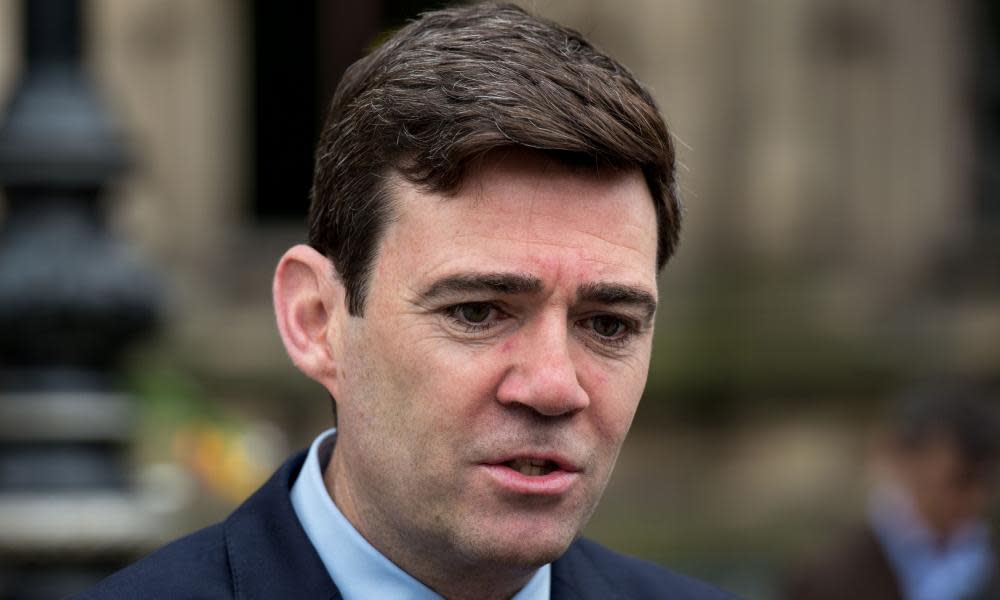Theresa May failing to foot full bill of Manchester attack, says Andy Burnham

The government has committed to reimbursing Greater Manchester just £12m of the full £28m cost of dealing with the aftermath of the Manchester Arena bomb, leaving the NHS and other services “significantly short”, the region’s mayor, Andy Burnham, has said.
On Friday, six months on from the attack on a concert by American singer Ariana Grande which killed 22 people, Burnham said he had received a letter from Theresa May saying the government would pay only the “reasonable costs” relating to the terrorist atrocity.
In a statement, the government committed to covering just £12m of the total, while Burnham said the letter from the Home Office was “inconclusive” in terms of how much the government would pay back. “On the NHS they have met the mental health element but not other aspects of the massive extra costs the NHS incurred, including overtime and many other things, which looks like it will leave the NHS significantly short,” said Burnham.
He claimed the government would not commit to paying in full a bill from Greater Manchester police (GMP) for its bomb-related costs. “On police costs they say: ‘We have got your bid and we will decide what’s reasonable,’” he said. “It’s not good enough. We’re not trying it on here. It’s all reasonable.”
A government spokesperson said there had been a “strong assurance” that Manchester would receive £12m and added: “This is an ongoing process and the government stands by its commitment to provide all necessary further assistance.” Last week the prime minister told MPs the government would make available “the majority of funds”.
Officers from all over the UK were drafted in to deal with public policing following the attack on an Ariana Grande concert at the arena. Further officers were drafted in to help with the criminal investigation, which resulted in the arrest of 23 people, the searching of 30 addresses and the seizure of more than 11,000 pieces of evidence. At least 100 officers are still working full time on the investigation; earlier this month, an extradition request was made for the bomber’s younger brother in Libya.
The mayor said the government should have dealt with the arena bill in Wednesday’s budget, when the chancellor, Philip Hammond, promised £28m to the victims of the Grenfell fire.
“It’s six months on now from the bomb in the week of the budget. At the time we were promised by various government minister and officials that we would get whatever we needed. They have done the right thing by Grenfell and they should do the right thing by the people of Greater Manchester too. I am not quibbling over one penny of what the Grenfell people have got, because they absolutely deserve it. But the same principles should apply for Greater Manchester,” he said.
Burnham said he sent a letter to the prime minister about four months ago with a detailed breakdown of the £28m costs Greater Manchester will have to spend dealing with the events of 22 May. That includes £17m already spent, largely on policing and NHS, he said, plus an additional £11m for the inquests of the 22 victims, as well as for the bomber Salman Abedi, and for an independent review being carried out by Lord Kerslake.
According to Burnham, the £28m figure consists of £9.8m in policing costs, £2.6m in mental health support, and nearly £3.7m in NHS and ambulance service expenditure in the aftermath of the bombing. An additional £5m has been requested to cover the cost of coroner inquests relating to the attack and Greater Manchester has requested £7m to counter the negative economic consequences of the suicide bombing and to add to the We Love Manchester emergency fund.
If the government did not pay up in full, it would lead to further cuts in public services in Greater Manchester, Burnham said. “It’s not acceptable.”
Sir Richard Leese, the leader of Manchester city council, said: “We were assured at the time of the Manchester Arena attack that the costs incurred by the city’s public services as a result of that terrible event would be fully supported by government. This still hasn’t happened.
“While the government has gone some way towards addressing this, for example through a donation of £1m to meet the administrative costs of the We Love Manchester Emergency Fund, their response is incomplete and inconclusive. Manchester will continue to push to ensure that those costs are met in full so there is no knock-on effect on our budget for public services.”
Patrick Greenfield contributed to this report

 Yahoo News
Yahoo News 
